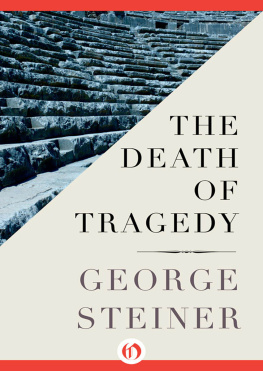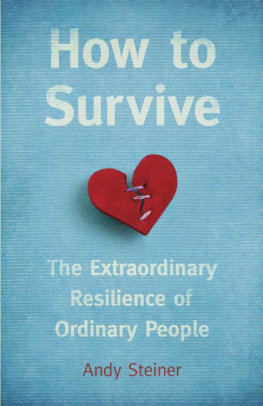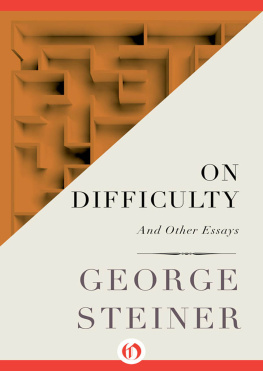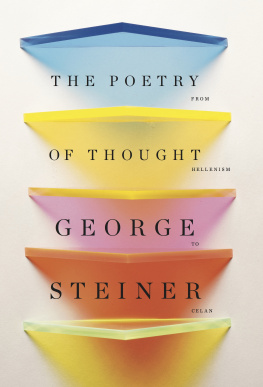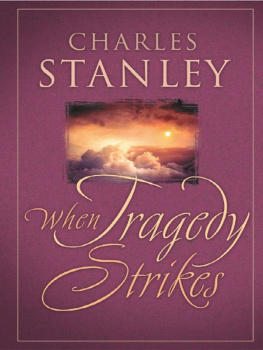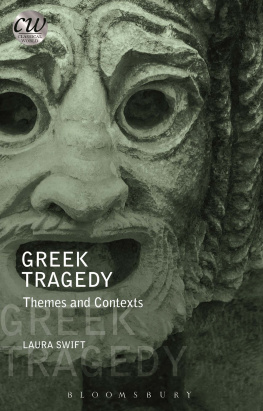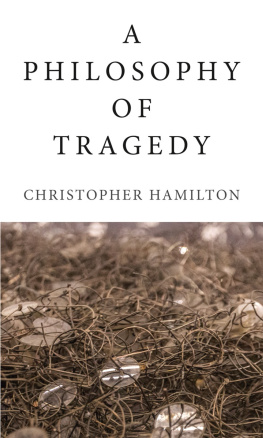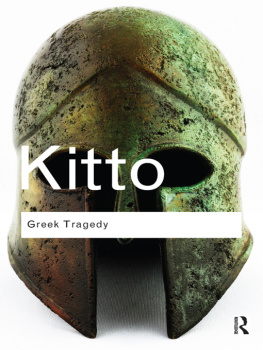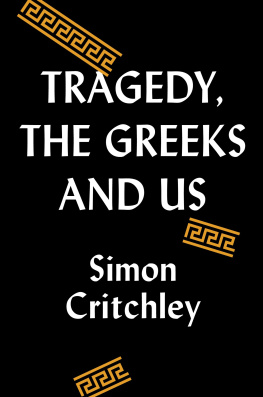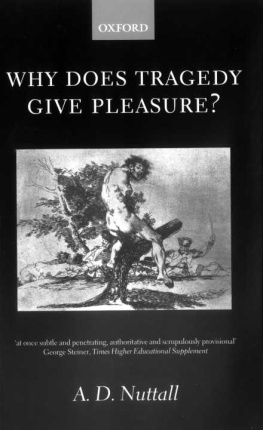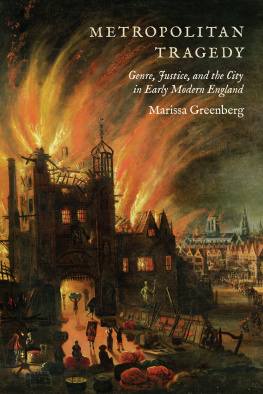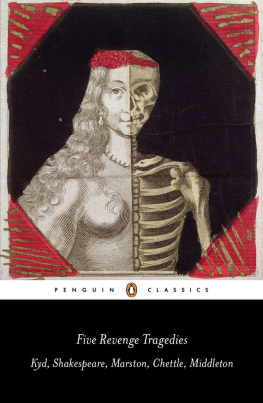The Death of Tragedy
George Steiner

FOR
MY FATHER
Contents
Acknowledgments
I N A SHORTER , more schematic version, this book was first presented at a Gauss Seminar at Princeton University. Those who have attended these occasions will know how much the speaker owes to the chairmanship and cross-fire of R. P. Blackmur and to the erudite vigilance of Professors E. B. E. Borgerhoff and Edward Cone. I wish to add a special thanks to Roger Sessions, who gave to the seminar the warmth and authority of his presence.
The expansion of the book into its present form was made possible by a grant from the Ford Foundation administered through the Council of the Humanities of Princeton University to foster work in comparative literature. This grant enabled me to get on with the job while teaching only part-time. My warmest thanks go to Professor Whitney Oates and Professor R. Schlatter. I am the more grateful as this book does not represent precisely what its learned sponsors had in mind. But writers tend to be mutineers, even against generosity.
I owe particular thanks to my editor, Mr. Robert Pick, of Alfred A. Knopf, Inc. The counsel he gave and the pleasure he took in the work were both of great value to me.
Principally, however, this essay belongs to my father. The plays I discuss in it are those which he first read to me and took me to see. If I am able to deal with literature in more than one language, it is because my father, from the outset, refused to recognize provincialism in the affairs of the mind. Above all, he taught me by the example of his own life that great art is not reserved to the specialist or the professional scholar, but that it is best known and loved by those who live most intensely.
G. S.
Foreword to the Galaxy Book Edition
I T IS AN AMBIGUOUS PRIVILEGE to be allowed to write a new foreword to a book which is now twenty years old. One is not the same writer as was the author at the time. And one is not the same reader. This is true in two respects. I do not read, I do not try to interpret today the texts cited in The Death of Tragedy as I read and interpreted them before 1960. But, this displacement being the more disconcerting, I do not even read myself as I then did. Inevitably, this book has taken on an identity of its own. It stands somewhat outside what I now (inexactly) remember to have been its aim and conduct of persuasion. It has induced a certain secondary literature. Other readers have approved of the argument or rejected it, proposed addenda and corrections, used one or another of its sections for their own purposes. Today, these external readings are bound, in some measure, to interleave with my own.
If I was to rewrite The Death of Tragedy (and my favourite critic was the one who lamented the waste of so fine a title on this particular work), I would attempt a change of emphasis at two significant points. Furthermore, I would try to develop a theme which, as I now see it, was implicit in the argument from the outset, but which I did not have the nerve or acuity to make explicit.
The book begins by stressing the utter uniqueness of high tragedy as it was performed in fifth-century Athens. Despite suggestive attempts by comparative anthropology to relate Greek tragedy to more archaic and widespread forms of ritual and mimetic practise, the fact remains that the plays of Aeschylus, of Sophocles and of Euripides are unique not only in stature but also in form and technique. No fertility or seasonal rites however expressive, no dance-dramas of south-east Asia however intricate, are at all comparable in inexhaustibility of meaning, economy of means and personal authority of invention with Greek classical tragedy. It has been argued, plausibly, that Greek tragedy, as it has come down to us, was devised by Aeschylus, that it represents one of those very rare instances of the creation of a major aesthetic mode by an individual of genius. But even if this is not the case in any strict sense, and even if Aeschylaean drama stems from a multiple background of epic idiom, public mythology, lyric lament and the ethical-political postulate of compelling civic and personal issues as we find it in Solon, such drama nevertheless constitutes a unique phenomenon. No other Greek polis, no other antique culture, produced anything that resembles fifth-century Attic tragic drama. Indeed, the latter embodies so specific a congruence of philosophic and poetic energies, that it flourished during only a very brief period, some seventy-five years or less.
The book is unequivocal on this point. What I ought to have made plainer is the fact that within the corpus of extant Greek tragic plays those which manifest tragedy in an absolute form, which give to the word tragedy the rigour and weight I aim at throughout the argument, are very few. What I identify as tragedy in the radical sense is the dramatic representation or, more precisely, the dramatic testing of a view of reality in which man is taken to be an unwelcome guest in the world. The sources of his estrangementGerman Unheimlichkeit conveys the actual meaning of one who is thrust out of doorscan be various. They can be the literal or metaphorical consequences of a fall of man or primal chastisement. They can be located in some fatality of over-reaching or self-mutilation inseparable from mans nature. In the most drastic cases, the human estrangement from or fatal intrusion upon a world hostile to man can be seen as resulting from a malignancy and daemonic negation in the very fabric of things (the enmity of the gods). But absolute tragedy exists only where substantive truth is assigned to the Sophoclean statement that it is best never to have been born or where the summation of insight into human fortunes is articulated in Lears fivefold never.
The plays which communicate this metaphysic of desperation would include The Seven Against Thebes, King Oedipus, Antigone, the Hippolytus and, supremely, the Bacchae. They would not include such dramas of positive resolution or heroic compensation as the Oresteia and the Oedipus at Colonus (though the epilogue makes of the latter an ambivalent case). Absolute tragedy, the image of man as unwanted in life, as one whom the gods kill for their sport as wanton boys do flies, is almost unendurable to human reason and sensibility. Hence the very few cases in which it has been rigourously professed. My study should have made this classification sharper and should have been more thorough in differentiating between the theological implications of absolute and of tempered tragedy.
At the close of The Death of Tragedy, I put forward the opinion that the works of Beckett and of the dramatists of the absurd will not amend the conclusion that tragedy is dead, that high tragic drama is no longer a naturally available genre. I remain convinced that this is so, and that the masters of drama in our century are Claudel, Montherlant and Brecht (Lorca over brief, lyric stretches). But the discussion ought to have been fuller, and I should have tried to show in what ways the minimalist poetics of Beckett belong, for all their express bleakness and even nihilism, to the spheres of irony, of logical and semantic farce rather than to that of tragedy. It is as if the best of Becketts, of Ionescos, of Pinters plays were the satyre-plays to unwritten tragedies, as Happy Days is the satiric epilogue to some distant Prometheus. If there has been a recent tragedian in a genuine sense, it is probably Edward Bond. But both

